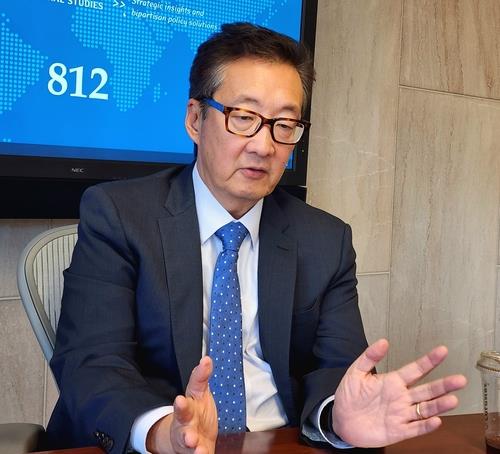By Song Sang-ho
WASHINGTON, April 4 (Yonhap) — A prominent U.S. scholar on Thursday criticized China’s abstention in a recent U.N. vote on the mandate of an expert panel monitoring the enforcement of anti-North Korea sanctions as a sign of Beijing’s “incompetence” and “cowardice.”
Victor Cha, Korea Chair at the Center for Strategic and International Studies (CSIS), made the remarks, referring to last week’s failure by a divided U.N. Security Council (UNSC) to adopt a resolution to extend the panel’s mandate due to Russia’s veto.
Absent the resolution’s passage, the panel’s mandate is set to end on April 30, a termination that observers say could chip away at international efforts to implement the sanctions regime designed to curb Pyongyang’s nuclear and missile threats.
“That, to me, is either incompetence in the sense that they couldn’t make a decision … It shows no guts because if they are going to go with the Russians on this, then just go with the Russians on it,” Cha said during an online CSIS forum.
“They abstained, which is just to me a sign of either incompetence or cowardice,” he added.
Victor Cha, senior vice president for Asia and Korea Chair at the Center for Strategic and International Studies (CSIS), speaks during an interview with Yonhap News Agency at CSIS headquarters in Washington on Oct. 5, 2023. (Yonhap)
Russia’s veto, though expected, added to growing concerns that deepening disunity at the UNSC could weaken the global sanctions regime against Pyongyang, while an intensifying Sino-U.S. rivalry might shrink room for cooperation between the two superpowers in reining in North Korean threats.
Cha underscored China’s role in addressing Pyongyang’s nuclear quandary.
“Everybody points to the so-called failure of U.S. policy to stop North Korea from going nuclear,” he said. “This will be written about as the biggest failure in Chinese foreign policy history.
The scholar warned that by the end of the decade, North Korea is going to have a nuclear force, the size of Britain or France.
“This is China’s mess and they really need to start getting serious about cleaning it up,” he said.
“On the part of China, this is the height of either incompetence or cowardice. They either can’t make a decision or they don’t want to say which side they are on on this, and they really need to.”
Cha, in addition, noted that America’s policy priority at this point appears to lie on addressing the North’s proliferation activities rather than on its denuclearization, though its denuclearization continues to remain the U.S.’ “goal.”
“The priority right now is to try to stop any proliferation behavior on the part of North Korea, and then also to do what we can to stop this DPRK-Russia thing,” Cha said, referring to burgeoning military cooperation between Pyongyang and Moscow.
DPRK stands for the North’s official name, the Democratic People’s Republic of Korea.
sshluck@yna.co.kr
(END)


